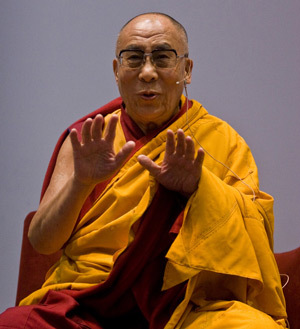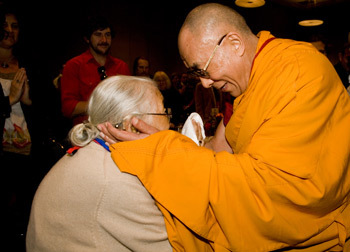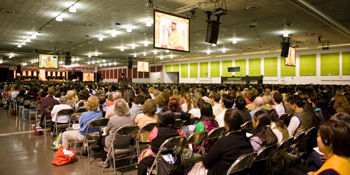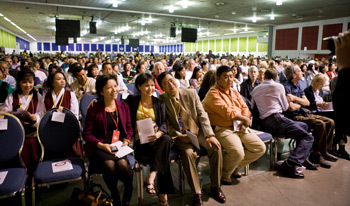San Jose, California, USA, 12 October 2010 - His
Holiness the Dalai Lama had two main public programs on his first full day in San Jose. In the morning, he addressed the Tibetan and
Himalayan communities in a special audience in the San Jose Convention Center,
which is adjacent to his hotel.
Organized
by the Tibetan Association of Northern California (TANC), His Holiness was greeted
at the venue by representatives of the Association and offered the Doso Chema
as a group of young artists performed the Tashi Sholpa.
After His
Holiness went up the stage, students of the Tibetan culture school led the singing
of the Tibetan National Anthem. Thereafter, TANC President Kaydor Aukatsang gave
an abridged work report. He said the Association had around 2000 members and that
they had found a place for the proposed community center. He requested His Holiness
to kindly consecrate the Center during a visit to San Francisco. He also outlined some of the
activities. He said for the ongoing Tibetan elections process 480 people had
completed their voter registration and that 337 of them had participated in the
primary voting that took place early in October.

His Holiness the Dalai Lama speaking to the Tibetan community in California on October 12th, 2010. Photo/Lobsang Wangdu
In his
remarks, His Holiness talked about the richness of the Tibetan spiritual and cultural
tradition. He said the Tibetan version
of the Tengyur (commentary to the Buddha’s teachings) may be the most inclusive
compared to, for example, the Chinese version. He said that in the past 50
years the Tibetan people have been generally successful.
He urged
the Tibetan people to really try to understand their spiritual tradition and
not to treat it merely as a ritual. For
example, His Holiness said they should look at the Buddhist scriptures like
Kagyur and Tengyur as textbooks that need to be studied. He added that studying
the scriptures was not something that only the clergy should be doing. His
Holiness said even lay people can and should be well versed in the scriptures
and mentioned the example of Barshee Pala, who he said could quote at length
from the scriptures. His Holiness said
after repeated suggestions now there is the trend of lay people all over the Himalayas doing a more substantive study of the
scriptures and talked about his experience during a recent visit to Ladakh when
he found the lay Ladakhis participating in serious scriptural debates
His
Holiness said that in addition to the study of the Tibetan religious and scriptural
tradition it is also essential that people really be educated in the modern
sense. His Holiness said the absence of a modern education system was a baneof
the past Tibetan society saying that the previous 13th Dalai Lama did make an effort
by sending some Tibetans to study in England. His Holiness urged the people to
think of specializing in subjects.

His Holiness greeting an elderly member of the Tibetan community. Photo/Lobsang Wangdu
His
Holiness also urged the people to be alert as there is the risk of declining moral
character. He said our spiritual tradition played a useful role in making us morally
strong. He recalled his conversations with officials in Spiti regions in India, where
the people are traditionally Buddhists. He recalled the officials as saying
that once the people became exposed to the mainstream life in India their moral
character seem to be declining. His Holiness said he had discussed this issue with
the then Indian Prime Minister Indira Gandhi.
Talking
about decline in the Tibetan character, His Holiness referred to some people who
used devious means to go and stay in other countries and thinking only of the self
while not caring for the implication to the community in the process. He said there was a time when the Tibetan
name had very high credibility. He said there was thus a risk and the people
need to be alert to maintain their traditional characteristic that has been
much admired by the outside world. His
Holiness recalled meeting Chinese who had visited Tibet and who talked about the very
positive atmosphere in their interaction with Tibetans as compared to Chinese themselves.
His Holiness asked the Tibetan people to be always mindful of the hope that the Tibetans in Tibet place on us. He said he admired the determination and courage of the Tibetans in Tibet.
His
Holiness said he will not expand on the political aspect of the Tibetan issue
as the Kalon Tripa and the Kashag will be briefing the people regularly. He,
however, talked about his concern about Tibetan environment and said he had
heard reports about the negative impact to the environment of relocating
Tibetan nomads.
Prior to
the Tibetan audience, His Holiness attended an event where the Gyuto Vajrayana
Center made a presentation of its
project proposal of establishing a Tibetan monastery in the San Francisco area.
In brief
remarks, His Holiness talked about the importance of such centers given the history
of destruction of Tibetan spiritual and cultural institutions in Tibet. In addition
to the physical destructions of 6000 temples and monasteries, His Holiness said
two years ago, a Chinese Communist official had talked about plans to turn the Tibetan
monasteries, which have traditionally been living learning centers, to mere museums
with some caretakers. His Holiness said now the real learning centers for Tibetan
spiritual culture was outside of Tibet. In India, His
Holiness said there were 10,000 monks and around 3,000 nuns undergoing study in
Tibetan institutions.
His
Holiness suggested that the Gyuto Monastery project should be a learning center
not just for Tibetan Buddhist culture but also act as a venue for serious
dialogue within the Buddhist tradition as well as with other traditions. His Holiness said while there were
philosophical differences all religions shared the same practice in terms of
promoting love and compassion. He said it should also try to conduct serious
dialogues between Buddhists and scientists.
His
Holiness thanked the supporters of the project but said they should also make sure
that the money they provide is not wasted.
In the
afternoon, His Holiness first addressed a gathering of Gyuto Center’s
supporters. He told them about his three commitments of promoting human values,
religious harmony and solution for the Tibetan issue. His Holiness said that the first two
commitments were messages of India
that he was conveying. His Holiness also answered some questions.
Thereafter,
His Holiness addressed a group of media personnel. Here His Holiness talked about his three
commitments. His Holiness said he talked about these three points wherever he
went. He said on his third issue of a
solution for the Tibetan issue, since 2000 there was an elected political
leadership and that he was in semi-retirement. He said now he was looking
forward to complete retirement.
His
Holiness first answered a question on cultivating compassion and explained the two
levels of compassion.
To a
question on his reaction to the announcement of the Nobel Peace Prize to Liu Xiaobo,
His Holiness said that right from the beginning he had been sympathetic and supportive
of those people who made some effort for more liberalization in the political
field. Specifically, when Liu Xiaobo
announced Charter 08, His Holiness said he was in Poland and as soon as he heard the
news he had expressed support. He said
this time, some Nobel Laureates, particularly Archbishop Tutu, had launched a signature
appeal for the Nobel Prize to be given to Liu Xiaobo and he was invited to join.
His Holiness that since he had made the worldwide appeal when the announcement to
award the prize to Liu Xiaobo was made, he felt happy.
His
Holiness recalled the time when he himself was awarded the prize. He said he
had told the media some time back that the prize did not amount to much of a
personal change as he was just a simple Buddhist monk. His Holiness said he saw
the prize as recognition of his contribution to promoting nonviolence and
compassion and this gave him some encouragement.
His
Holiness said that this time, too, he felt that this prize is some recognition of
Liu Xiaobo’s commitment of promoting
freedom and democracy and he should feel more encouraged to continue his work.
Asked to
comment on the Chinese Government’s reaction to Liu Xiaobo’s prize, His Holiness
said if he answered something, his opinion will not be of use and so he would
keep quiet.
Toa
question about the Gyuto Vajrayana Center’s
activities here, His Holiness said California
was a Multicultural state and so its project would be a small contribution to
this culture. He said he hoped this Center’s project would be a learning center
and a forum for dialogue between religious traditions as well as between
Buddhists and scientists.
At the
conclusion His Holiness reminded the media personnel that they too had a role in
promoting human values and religious harmony and encouraged them to spread this
message.
Thereafter,
His Holiness entered the Convention Center to provide a commentary on the Eight
Verses for Training the Mind, a text composed by Tibetan Buddhist Master Geshe
Langri Tangpa. The Convention Center was filled with a capacity crowd of 12,000
people.
His
Holiness began by giving a broad overview of Buddhism. He then explained the text
by putting it in current context as well as in relation to other religious traditions.

The Conventions Center in San Jose,site of His Holiness the Dalai Lama's teachings on October 12th, 2010. Photo/Lobsang Wangdu
He talked
about the fourth stanza as being a message for people not to reject or isolate
others, whether they are Aids patients or prisoners. Rather, he said people need to see how they
could include these individuals into the mainstream of the society. Similarly, His Holiness said the messages of
the 3rd and the 5th stanzas were similar to the messages in the Bible about the
cardinal sins and the turning of the other cheek. His Holiness also recalled an Islamic friend
telling him that one of the meanings of the term Jihad was confronting inner
mental afflictions.
His
Holiness said that the short text had messages that we should all be reminding ourselves
on a daily basis to become better persons. He suggested that people should start
experimenting by devoting a week to daily thoughts over the eight verses and implementing
them. If they find some benefit by the end of the week, they could extend it.
Eventually, when the mind is familiar with these points, His Holiness said that
real change will come about.

A capacity crowd of 12,000 listened to His Holiness the Dalai Lama at the Convention Center in San Jose on October 12th, 2010. Photo/Lobsang Wangdu
At the end of the event, and as it has become a practice set by His Holiness with organizers of public events in which he participates, the Gyuto Vajrayana Center presented a financial report. They announced that the event had a total estimated expense of $ 271,000 with total estimated income of $ 360,000. The difference of $ 89,000 will be distributed to three projects; Gyuto Vajrayana Center’s spiritual activities in the United States; promotion of health and education for the monks of the Gyuto Monastery in India; and projects devoted to health care of Tibetan refugees, particularly children and the elderly.












